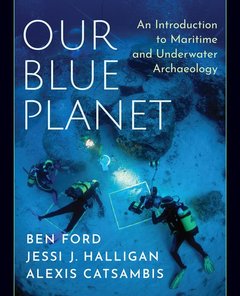Our Blue Planet: An Introduction to Maritime and Underwater Archaeology
Langue : Anglais
Auteurs : Ford Ben, Halligan Jessi J., Catsambis Alexis

Our Blue Planet provides a comprehensive introduction to the field of maritime and underwater archaeology. Situating the field within the broader study of history and archaeology, this book advocates that an understanding of how our ancestors interacted with rivers, lakes, and oceans is integral to comprehending the human past. Our Blue Planet covers the full breadth of maritime and underwater archaeology, including formerly terrestrial sites drowned by rising sea levels, coastal sites, and a wide variety of wreck sites ranging across the globe and spanning from antiquity to World War II. Beginning with a definition of the field and several chapters dedicated to the methods of finding, recording, and interpreting submerged sites, Our Blue Planet provides an entry point for all readers, whether or not they are familiar with maritime and underwater archaeology or archaeology in general. The book then shifts to a thematic approach with chapters exploring human interactions with the watery world, both along the coasts and by ship. These chapters discuss the relationships between culture, technology, and environment that allowed humans through time to spread across the globe. Because ships were the primary means for humans to interact with large bodies of water, they are the focus of several chapters on the development of shipbuilding technology, the lives of sailors, and the uses of ships in exploration, expansion, and warfare. The book ends with chapters on how and why the non-renewable submerged archaeological record should be managed, so that both current and future generations can learn from the achievements and failures of past societies, as well as on how anyone can become involved in maritime and underwater archaeology. Throughout, the reader benefits from the personal reflections of a number of leading figures in the field.
Ben Ford is a Professor of Anthropology at Indiana University of Pennsylvania specializing in maritime and historical archaeology. His Ph.D. from Texas A&M University was preceded by several years of cultural resource management experience and degrees from the College of William and Mary and the University of Cincinnati. He is a Registered Professional Archaeologist and the 2015 Archaeological Institute of America McCann-Taggart Underwater Archaeology Lecturer. Jessi Halligan is an Assistant Professor of Anthropology at Florida State University specializing in the geoarchaeology of inundated landscapes and the peopling of the Americas. Her PhD from Texas A&M University was preceded by several years of cultural resource management in the Northeast and Great Plains of the United States, and by a Bachelor of Arts in Anthropology from Harvard University specializing in archaeology. Alexis Catsambis is a Maritime Archaeologist with the Naval History and Heritage Command in Washington, DC, specializing in heritage management and nautical archaeology. He holds his doctoral and graduate degrees from Texas A&M University and completed his undergraduate studies with the Institute of Archaeology and Antiquity of the University of Birmingham. He serves on the Board of Governors of the Washington DC Society of the Archaeological Institute of America.
Date de parution : 06-2020
Ouvrage de 488 p.
23.6x19.3 cm
Date de parution : 06-2020
Ouvrage de 488 p.
23.1x19.1 cm
© 2024 LAVOISIER S.A.S.



